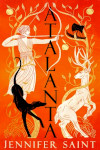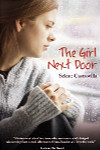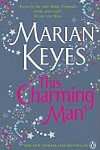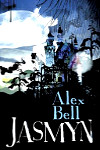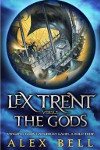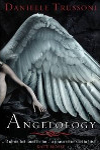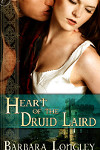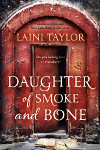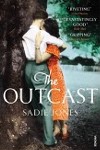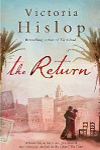Catherine Ryan Hyde – Second Hand Heart
Posted 19th August 2010
Category: Reviews Genres: 2010s, Spiritual
1 Comment

The general idea may be to let the past go, but sometimes memories can be the making of us.
Publisher: Black Swan (Random House)
Pages: 446
Type: Fiction
Age: Adult
ISBN: 978-0-552-77662-2
First Published: 16th September 2010
Date Reviewed: 18th August 2010
Rating: 5/5
Vida would have died without a heart transplant, in fact she’s been waiting to die all her life. Now, at 19 years old, she gets her chance when a woman is killed in a car accident. But what about that woman, or more so what about the husband the woman left behind? Maybe he shouldn’t have contacted Vida, but it’s done now – and is it possible Vida remembers things she’s never experienced?
Please note that the first part of the book, up until Vida has her operation, contains a lot of graphic descriptions of surgery. Should you wish to, skipping over it shouldn’t cause any problems in your understanding later.
My initial thoughts, as I waded through the first lot of pages, was that this was going to be a boring book. Admittedly I was reading this novel straight after having finished If I Stay and it was only recently that I also read Before I Fall, so the theme of being at death’s door wasn’t as compelling as it could have been; but the difference between those books and Second Hand Heart is that Ryan Hyde takes her story beyond the place where the others end. If we are to assume that those two books ended on a positive note then Second Hand Heart is like the continuation of what happens afterward.
I have quite a lot to say about the main character, Vida, as my feelings about her changed over the course of the book, and it was in a different way to how my feelings for characters have been known to change before. The first thing had just as much to do with Ryan Hyde. Vida is a brilliant storyteller, she speaks as you would imagine a teenager to speak, and it’s so much a case of her telling you rather than the collective “reader”. There is no trace of an author writing Vida’s diary, the way it’s written it really is as though the girl is real and wrote the pages herself. Now this isn’t to say that Vida will be as articulate as you would think a nineteen year old would be, and at first this is confusing. But when you learn how sheltered Vida was, and how she would have been put on a kind of pedestal by her worried mother, it makes sense. Vida’s never lived, and this she freely admits, offering her lack of education along with it.
Later on I started to get annoyed with Vida. Her mother told Richard how her daughter could be intense at times – but it didn’t help. Vida is intense and that’s understandable – she wants friends, she wants to know the world – but she crossed the line when it came to Richard. And not by loving him, because that was out of her control, but by contacting him too much when he needed space. A person in love can often feel the need to be with their beloved but Vida was well aware that the love she felt stemmed from the love Lorrie had felt and so should have backed off a little. Indeed she had something important to tell Richard, but it could have waited.
Lastly I came to terms with the fact that Vida was annoying and let her be. I was open to a change when she started becoming the person she will surely have been post-book, and began to feel better about spending so much time in her theoretical presence. There is no doubt about it, heck the amount I’ve just written is proof enough – Ryan Hyde has written a fantastic character who comes to life in a way that few other authors manage.
Richard, lovely as he is, is more a regular character, and he develops in a way similar to many another. But this is a good thing because it allows Vida to be the focus. This isn’t to say that Richard is unworthy, far from it, in fact it becomes the case that his transitions are just as important, but there is that difference there that is difficult to explain but very much needed.
The book deals with love, unsurprisingly, but not so much romantic as familial love and love for oneself. Actually, I’m including the love aspect in this review just so that I can introduce you to the following spot-on quotation:
I’m beginning to see that point about love you made when I first met you. Maybe it’s less like a valentine heart and more like a real one. Like maybe if you give somebody your heart it’s this bit gnarly muscle of a thing that’s not always too pretty to look at.
I’m going to make an incorrect assumption and then add the other side of the opinion to balance it out and cover all angles for debate. First, this book isn’t really about Vida, or Richard. It’s about the woman who died, Lorrie. In this sense Richards thinking behind his decision to give her heart up for transplant was right – Lorrie keeps on living through others, more so than she ever would have had she been buried complete.
Second, this book has everything to do with Vida and Richard, and it is about them finding themselves and their lives through the woman who died. Lorrie’s death didn’t just mean one person lived, it meant lots of people lived and found themselves in a position of change. Vida, her mother, Victor, Esther (who possibly wouldn’t have done what she’d wanted to do) and in a way, Richard. Richard learned to live without Lorrie, even if the best situation would’ve been that he didn’t have to.
There’s a part of me that embraces the first and another part the second. The second may be the correct one, but the first is equally compelling a thought, if not more so than the second. What will be your thoughts?
The school of thought is that everyone in life makes an impact of some sort, but more and more nowadays we worry about the size of the impact we will make; Ryan Hyde mentions this by having Richard donate organs to combat that reason. But ultimately she reminds us that we take what we can in memory and use it to make our own lives better. It may be a nice thought to try and keep someone alive and make them known to everyone, but few will be remembered for as long as the human race exists.
Second Hand Heart is a fantastic life discussion that has been superbly woven into a relatively slow-moving story. The desert setting is stunning but it wouldn’t have held up the book on it’s own, it’s the theme and characters that are most prominent. Because of the theme the book is drenched in the heat it gives off and it’s easy to become lost in it, and that’s just as well because not only is this a very good book, it’s an important one too.
I received this book for review from Transworld Publishing, Random House.
Related Books
Sasha Blake – The Wish
Posted 13th August 2010
Category: Reviews Genres: 2010s, Chick-Lit, Thriller
1 Comment

Some dreams push it a little too far.
Publisher: Bantam Books (Random House)
Pages: 436
Type: Fiction
Age: Adult
ISBN: 978-0-553-81916-8
First Published: 19th August 2010
Date Reviewed: 11th August 2010
Rating: 3/5
From the look of the cover, Blake’s The Wish looks like the Chick-Lit of Chick-Lit, so I was very surprised when it was more about getting away from money and living a normal life.
Lulu loves Ben, the son and heir of an entrepreneur. Ben just wants to get away from it all and in knowing Lulu he has found that there is a better life to be had than the one he lives. Ariel, Ben’s sister, wants more attention from her parents for all the good work she does, indeed she wants what Sunshine has, only for more virtuous reasons. Frank has a brilliant business – and he doesn’t know it, but it’s all down to his wife. And Sofia, his wife, has, does, and will stop at nothing to be the very best. Because being the most revered person is the most important thing in the world. Which is what Bessie believes too, even if you have to do one of the most hideous things ever in order to achieve it.
There are three levels to the book. Level one: money, pure and simple. The casino owners have it and they want more of it. Level two: getting away from money. Money isn’t the greatest element of life and is a poor, nay empty, substitute for love, family, and happiness. Level three: money. The filthy rich may have other things in mind but those who stray are often already too caught up to leave it.
The plot is completely character-driven. Blake tells the story through the eyes (though in the third person) of most of each of the main, and some of the secondary, characters. She could have got away with limiting the number of people she used because to be honest some of the characters favoured, although important in their own way, are all to similar to one another, and because there are so many people they overlap in the stories too many times. A couple of the more interesting characters (read: of difference status and mind) are dropped altogether soon after their introduction and while their purpose may have been amply served the difference in them would have enlivened the story further.
One of the themes is family. Frank Arlington dotes on his daughter, but when she jumps ship and goes to work as a stripper for a rival company he lets her get on with it. The Arlingtons have money but Frank knows that there are more important things like that and that his daughter should wallow in what she’s done because he had treated her fairly. Ariel wants her father to give her a promotion and goes to the rival when he doesn’t. It’s a bitter period of familial estrangement that’s wholly needed in a place where money has slyly replaced relationships.
Relationships are more important to these people than they realise. The core of the story rests in the decisions Sofia made when desperate to gain status. She never wavers, yet the person directly involved in her decisions does. Bessie was perhaps worse than Sofia, but she realises her mistakes, even though it’s too late (this is something you learn early on and thus not a spoiler).
I am undecided as to whether the book’s cover is a stroke of genius or a hindrance. On picking the book up I expected money, diamonds, shallow and narrow-minded people and while the book has plenty of all of those thing I was most definitely not expecting to read anything about war.
Yes, war. War has quite a lot to answer for in the character of Sofia. You wonder if she would have been the same person had she not experienced what she had. Certainly she learned the value of family, but at the same time she possibly learned that some people were expendable.
The problem with The Wish is that it is predictable and not unique. It’s a story that’s been told hundreds of times ever since casinos opened. Fortunately, Blake’s discussion of relationships and inclusion of money-driven yet not money-focused characters keeps the book above the water. She knew that she could use her story to provide a lesson to her readers but knew that she was limited by this same story from going too far without changing the genre and plot completely. I say that within the confines she has done very well. It will be interesting to see how, if she so chooses, Blake will continue on this theme in the future.
I received this book for review from Transworld Publishing, Random House.
Related Books
Alex Bell – The Ninth Circle
Posted 11th August 2010
Category: Reviews Genres: 2000s, Mystery, Theological, Thriller
Comments Off on Alex Bell – The Ninth Circle

Good and evil fight against each other, but sometimes it’s the middleman who is in the right.
Publisher: Gollancz (Orion Books)
Pages: 262
Type: Fiction
Age: Adult
ISBN: 978-0-575-08465-0
First Published: 2008
Date Reviewed: 15th June 2010
Rating: 5/5
Gabriel doesn’t remember how he ended up on the floor of his flat, but he’s been bleeding and there’s a significant amount of money on the kitchen table. He’s able to find out his name pretty quickly but no other information seems to exist. Should he wait for someone to come looking for him, wondering about his absence in their life? He knows that he’s in Hungary and that he speaks Hungarian but that he’s from England and speaks English as well as a possible several other languages. He seems to be a writer – an unpublished one by the look of his zealous manuscripts – and possibly a madman. For Gabriel has been having weird visions since he woke up, of flaming men, and has seen people who don’t appear to actually be there. Why is he receiving packages and whom are they from? And why was his previous self so obsessed with Hell?
The Ninth Circle is a remarkable book, and for the first time in ages my sky-high expectations were justified, ten-fold. Bell has written a novel that successfully takes a look at subjects that have been raised before, but applied them to her characters in a whole new way. The book is structured as a diary but unlike a lot of diary-structured books it’s easy to forget that it’s in the first person.
Bell has done research, and put her education to good use. She’s read up on a variety of topics, some of which aren’t even fundamental to the plot, and delivered back to the reader her findings. On her blog she herself says that she’s interested in World War II (and there is an event described in her book in great detail), and she studied Religious Studies – but baring her own interests it is clear she’s spent time on extra and useful information. This means that you come away with a lot more knowledge on things that aren’t neccersarily imperative to the story itself.
The nucleus of the novel is religion, which I’m actually not too happy about saying because for me it was a shock (a good one) and the thing that first made me start reading faster because it was so unexpected – but I know that won’t be the case for everyone and so it must be said. The Ninth Circle deals with the apocalypse, the beginnings of it that is – there are no full-scale battles – and in case you are put off by this idea I must say that this book is not Christian fiction, in fact although one may believe that Bell is a devoted Christian if you are excited by this suggestion then you will be disappointed later. Bell does not look at the topic with a religious fervour, rather she has stood watching from the sidelines. And if I have appeased those who do not want to read Christian fiction then I should also appease those who do want to read it – Bell is no Philip Pullman, she is fair in her convictions without bias. There is no reason why either camp should not enjoy this book.
Gabriel is a strange character to get used to, not so strange in himself (because you understand early on that there’s going to be a reason for all his visions and feelings) but because he edges toward one notion before seeming to go back to another. Is he a likable person? That’s hard to decide, but he’s certainly compelling and a fantastic fictional hero and narrator. The other character of particular note is Stephomi. You’ll change your mind many a time about him, but is that perhaps what he’s looking for? Because you want to believe he’s good, don’t you? It’s a relief to find out that he is, isn’t it? There is equality between characters and plot, both are as important as each other. The locations in the book are all real places in Budapest and Bell is adept at weaving eerie mists over it to make you curious and longing to visit, while simultaneously being alarmed by the idea.
Bell’s writing is of very high quality; the only thing that sticks out is her reliance on emphasised words. There are a lot of them, sometimes too many, but it does cause you to delve deeper into the presented situation overall, and once you’re a fair way through the book you get used to it, it’s just her style.
The Ninth Circle is brilliant – but do I like it, as in did I feel comfortable reading it? The thing is that you’re forced to think about things that we, as humans, generally try not to think about. Whether or not we believe in God we do in general believe that there is a distinction of sorts between right and wrong and good and bad (though Bell makes the poignant proposal that they are not so different, like heat at it’s hottest feels cold, like the phrase “two sides of the same coin”), and also, to my knowledge, we tend to believe in evil, again no matter our faith. It’s easier to be bad than good, being good takes more effort, and it’s easier to submit to the devil – this is a well known thought in religion, God needs us to work (and so does the devil, but his requests are easier). Submitting to evil brings instant reward, working hard to be good may not and often leads to pain before happiness. We know this, and it scares us, and in introducing us to the demons in an intimate way through the characters Bell is exposing us to what we fear, and that concept is something we worry about – being exposed to our fears.
I wonder if the reader feeling uncomfortable was what Bell had in mind. In fact no matter what she had in mind she’s succeeded in her goal, as I will definitely be thinking about this novel further and recommending it to everyone who talks to me about books. It’s going to stay in my head for a long time and will probably factor in any conversations I may have on religion, the future, and the apocalypse.
Read it and enjoy. Gabriel’s loss is our gain.
Related Books
Lauren Kate – Fallen
Posted 3rd August 2010
Category: Reviews Genres: 2000s, Paranormal, Romance
3 Comments
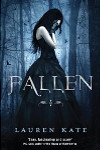
The cover looked amazing. I turned the title pages to the beginning and was floored by the Victorian dark paranormal romance – this was going to be an incredible story. But then I reached chapter one and the modern day America set-up. My heart sunk. Twilight, only this time Edward Cullen was to be an angel.
Publisher: Corgi (Random House)
Pages: 452
Type: Fiction
Age: Young Adult
ISBN: 978-0-552-56173-0
First Published: 2009
Date Reviewed: 2010
Rating: 0.5/5
For the first time ever I’ve started writing a review long before I’ve finished the book – because I can, because I know exactly what’s going to happen throughout. Rest assured however that by the time this review is finished the book will have been also as I don’t like the idea of heckling something I’m not completely knowledgeable about.
Yes, there are a lot of problems with Fallen which is quite ironic considering it’s title, so I’d like to get all the similarities with Twilight listed so that we can move on to more positive aspects (indeed there actually are some).
Luce asks her friend what the arrogant boy’s problem is – the hero is an arrogant boy, prone to bouts of anger; Luce is clumsy and boring, her home town is called Thunderbolt and she has an old banger of a car; there’s a girl with a pixie haircut and Daniel seems to have unlikely friends; Daniel saves Luce from a falling statue; Luce does research to find out about Daniel; there’s a big lovely looking place they go to, open and scenic; Daniel’s skin looks golden and radiates the light when he’s in the sun; Daniel is always telling Luce to stay away from him; when a fight breaks out outside school, suddenly Daniel’s there and he whisks her home in a car. He’s very angry throughout the journey. The bad guys are after Luce and only Luce all the time; the long drawn out ending doesn’t solve anything; it looks like Daniel won’t be in the next book with Luce much…
I am astonished that Kate hasn’t been had up in court and fined profusely for this blatant plagiarism. Kate would have to be a very slow writer to have started this book before Meyer came on the scene.
None of the things I mentioned in the list are spoilers because this is a very predictable book. The one thing I was hoping for however was that Luce would be something else, and she’s not, she is Bella all over; in fact she is a contradiction. Kate tells us that Luce is very clever and at one point Luce is telling Daniel about all the academic achievements she’s gained in life – but never once does Luce come across as a good student. She seems incredibly ignorant and although she gets bored in classes it’s only because they are so long, not because the are at such a low level. She never once acts at all like someone who is studious.
There are some good points to the book, the most important being that yes, it does intrigue you to read the next one, even if you decide that there are a hundred books worth your time first and even if it’s just to find out how much like New Moon it will be. It takes a while but Kate finally lets up on the paraphrasing and starts crafting her own story and although it may not be what it could’ve been it’s decent enough (as long as what you’re expecting is teenage angst and damsels in distress). The history element is unique. Daniel may have lived as long as those sparkly vampires but we’ve got Luce’s lives to catch up on too. It will be interesting to see what Kate does about the religious aspect of the story: will she just exploit the angel idea or will she put a theological bent on it?
The writing is bad and at times it appears Kate forgets even the biggest issues. Luce gives her watch to a teacher because the pupils aren’t allowed them – but a little while later she looks at the time on her watch. Luce takes a sip from a bone-dry latte – how that works I’ve no clue.
The sky was that no-color color.
So was the sky coloured or not?
She’d always loved the fairly sweet musty way that only a roomful of books smelled.
Terrible.
Fallen would have been a far better book had Kate set it back in time during one of Luce’s previous lives, and made the story darker and more mature. If she had done that she would have escaped a lot of the criticism given to her.
If you want to read Twilight without reading Twilight, read Fallen. You’ll be able to converse fluently in discussions about Stephenie Meyer’s work by the time you’ve reached the end.
Related Books
Janice Y K Lee – The Piano Teacher
Posted 25th July 2010
Category: Reviews Genres: 2000s, Historical, Political, Romance
Comments Off on Janice Y K Lee – The Piano Teacher

War affects everyone involved in different ways, and sometimes it doesn’t just stop with those around at the time.
Publisher: Harper Press (Harper Collins)
Pages: 329
Type: Fiction
Age: Adult
ISBN: 978-0-00-728637-9
First Published: 2009
Date Reviewed: 21st July 2010
Rating: 3/5
A few years after WW2, Claire moves with her husband (a marriage of convenience) to Hong Kong, setting herself up as a piano teacher for a local family. She starts to become acquainted with the community yet always remains on the outside. At one of these parties she meets Will, an Englishman employed by her own employers, and the two begin an affair. But Will is constantly distant and there’s something amiss about the Chen family. As the story unravels we are introduced to another tale – Trudy Liang ten years earlier, a beautiful woman who once called Will her lover.
Before reading The Piano Teacher I’d gone for a good few months without historical fiction and the setting of this book and the summer-read aspects meant that I read it incredibly fast. But speed-reading isn’t so much a positive thing with this book – you find yourself reading it quickly because there’s nothing to peak your interest. It isn’t until much later on that it begins to show promise. A big factor in this is that it is mostly era-driven. It’s the war that is paramount here. Lee has written her book akin to the way Victoria Hislop did a year earlier in The Return, it’s very much a case that the characters serve a purpose as vehicles – they are simply there to aid the explanation of the wretchedness of the war. However, unlike Hislop, who used a number of characters to explain different situations, Lee has focused on specific features, she mentions the bombing but focuses on the predicament of the civilians, for the most part the foreigners (Americans, Britons, Europeans) who were stuck in Hong Kong when the Japanese took over. The information is fascinating and horrid in it’s own right but as the focus is on the war you can’t help but feel disconnected from the characters for whom there are parties and a little love but not much else to recommend them to your memory.
Then it all changes. From era-driven the narrative nose-dives straight into the characters, suddenly they are everything and the war is still important but more the cause, it’s no longer in the spotlight. Where Claire was the only character available for comment there is now a crowd of willing participants.
By themselves the characters are fabulous. Claire begins a possible racist and ends as perhaps the most open-minded of the lot. It takes a while to warm to her and even then sometimes you want to change your opinion, but you can’t because you know that she knows of her flaws and that she’s struggling to work through them. Will’s aura is enticing and his distance and pain understandable, but maybe he could have handled things differently. The Chens remain unlikeable and plummet further as the story goes on, and Trudy, though but a memory, is an enigma.
Because the different aspects are so disjointed it’s easy enough to close the book at the end. You feel sad for what’s happened but because you weren’t acquainted with the characters for long enough it’s difficult to feel their plight beyond the general understanding that what happened was awful. Part of this can be explained by taking into account the book’s title – it doesn’t really say what the book is about as Claire (the piano teacher) is very much apart from the rest of the story even when she meets those involved. She develops into a strong character and the end suggests she would be an interesting person to read about further – only of course you can’t because the book has ended. Claire made a few people talk about the issues, but nothing she did caused anything that wouldn’t have happened anyway because although she gains information she never uses it. This book could have easily been called something in reference to Will, Trudy, her cousin, the Chens, or the war. It is so unspecific that yes, I do believe it impacts upon your enjoyment because you open the book having ideas of a completely erroneous nature.
Lee provides ample time to the different nationalities. She writes about a country ruled by foreigners but never slanders anyone, and when it comes to the invasion she simply details, never condemns. Her characters get on with everyone. There is still racism about but in most cases the characters have already rejected it.
Lee’s writing is lovely, not incredible, but noticeable. She prefers some words at strange times however, for example, “brackish”: “The sea was green and brackish” – the word is like a crack in an otherwise perfectly smooth pavement, it doesn’t fit in with the rest of her writing. The chapters move between tenses and while Claire’s flow well it seems that when it came to Trudy, Lee wasn’t sure how she wanted to write it. There are a couple of times when both styles are used in the same chapter and you find yourself reading the same sentences over to try to work out exactly what you’re reading.
I think that if you’re looking for a breezy summer read with a bit of substance you’ll be satisfied but in my personal opinion The Piano Teacher does not fill the criteria for a good political historical novel.











